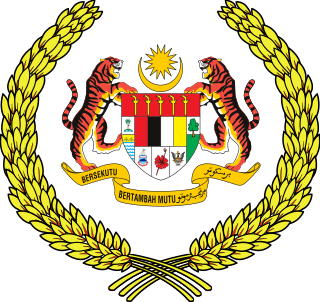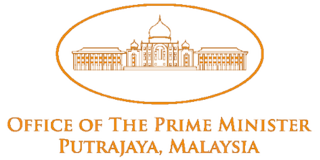
The Yang di-Pertuan Agong, also known as the Supreme Head of the Federation, the Paramount Ruler or simply the Agong, and unofficially known as the King of Malaysia, is the constitutional monarch and head of state of Malaysia. The office was established in 1957, when the Federation of Malaya gained independence from the United Kingdom. The Yang di-Pertuan Agong is elected by the Conference of Rulers, comprising the nine rulers of the Malay states, with the office de facto rotated between them, making Malaysia one of the world's few elective monarchies.
In Malaysia, the Yang di-Pertua Negeri is a constitutional title given to the head of state in states without a ruler, namely: Penang, Malacca, Sabah and Sarawak. This is in contrast to a Ruler which is a constitutional title given to states with hereditary monarchies, namely: the Sultans of Johor, Kedah, Kelantan, Pahang, Perak, Selangor and Terengganu; the Raja of Perlis: and the Yang di-Pertuan Besar of Negeri Sembilan.

The Prime Minister of Malaysia is the head of government of Malaysia. The prime minister directs the executive branch of the federal government. The Yang di-Pertuan Agong appoints the prime minister as a member of Parliament (MP) who, in his opinion, is most likely to command the confidence of a majority of MPs. This person is usually the leader of the party winning the most seats in a general election.

Raja Permaisuri Agong is the title given to the consort of the Yang di-Pertuan Agong, the elected, constitutional federal monarch of Malaysia.

Judiciary of Malaysia is largely centralised despite Malaysia's federal constitution, heavily influenced by the English common law, as well as Islamic jurisprudence.

The Attorney General of Malaysia is the principal legal adviser of Malaysia. The Attorney General is also the highest ranking public prosecutor in the country and is also known as the Public Prosecutor, or simply PP. The powers with regard to prosecution is contained in Article 145(3) of the Federal Constitution. For instance, exercisable at his discretion, the Attorney General may institute, conduct or discontinue any proceedings for an offence, other than proceedings before a Syariah court, a native court or a court-martial.
Mohamed Salleh bin Abas was a Malaysian judge and politician. He was a Lord President of the Federal Court of Malaysia. He was dismissed from his post during the 1988 Malaysian constitutional crisis. This action was condemned internationally and widely considered to be the event that triggered a marked reduction in the independence of the Malaysian judiciary.

The Government of Malaysia, officially the Federal Government of Malaysia, is based in the Federal Territory of Putrajaya, with the exception of the legislative branch, which is located in Kuala Lumpur. Malaysia is a federation comprising the 11 States of Malaya, the Borneo States of Sabah and Sarawak, and 3 Federal Territories operating within a constitutional monarchy under the Westminster system and is categorised as a representative democracy. The federal government of Malaysia adheres to and is created by the Federal Constitution of Malaysia, the supreme law of the land.

The Court of Appeal is an appellate court of the judiciary system in Malaysia. It is the second highest court in the hierarchy below the Federal Court. This court was created in 1994 as part of reforms made to the judiciary to create a second tier appellate court after the right to appeal to the Privy Council of the United Kingdom was abolished in 1985. The court is headed by the President of the Court of Appeal of Malaysia, who is the second most senior post in Malaysian judiciary after the Chief Justice of Malaysia.
Tun Zaki bin Tun Azmi is a Malaysian barrister who served as the sixth Chief Justice of Malaysia. He was appointed by the Yang di-Pertuan Agong on 21 October 2008 after his predecessor, Abdul Hamid Mohamad, retired from office.
The chief judge of Sabah and Sarawak, formerly the chief justice of Borneo, is the office and title of the head of the High Court of Sabah and Sarawak. The title has been in use since 24 June 1994, when the High Court of Sabah and Sarawak was renamed from the High Court of Borneo.

Arifin bin Zakaria is a Malaysian lawyer who served as the seventh Chief Justice of Malaysia, serving from 12 September 2011, succeeding Zaki Azmi, until 31 March 2017.
Tan Sri Dato' Sri Ahmad bin Haji Maarop is a Malaysian jurist and lawyer who served as the tenth President of the Court of Appeal of Malaysia (PCA).

The President of the Court of Appeal of Malaysia, is the office and title of the deputy head of the Malaysian judiciary system. The title has been in use since 24 June 1994, when the Court of Appeal of Malaysia was formed. The President of the Court of Appeal is the head of the Court of Appeal, the second highest court of Malaysia. It is the second highest position in Malaysian judicial system after the Chief Justice of Malaysia and followed by the Chief Judge of Malaya, and the Chief Judge of Sabah and Sarawak.
This is a list of events in the year 2019 in Malaysia.

Tengku Maimun binti Tuan Mat is a Malaysian lawyer who has served as the 10th Chief Justice of Malaysia since May 2019. She is the first woman to ascend to the highest judicial office of the country.
Rohana binti Yusuf is the eleventh President of the Court of Appeal of Malaysia (PCA). She is the first woman to have been appointed into the office since its inception in 1994.

Tan Sri Datuk Amar Abang Iskandar bin Abang Hashim is a Malaysian lawyer and judge who serves as the twelfth President of the Court of Appeal. He previously served as the Chief Judge of Sabah and Sarawak (CJSS).
Tan Sri Dato' Seri Mohd Zuki bin Ali is a Malaysian civil servant who has served as Chief Secretary to the Government since January 2020.











